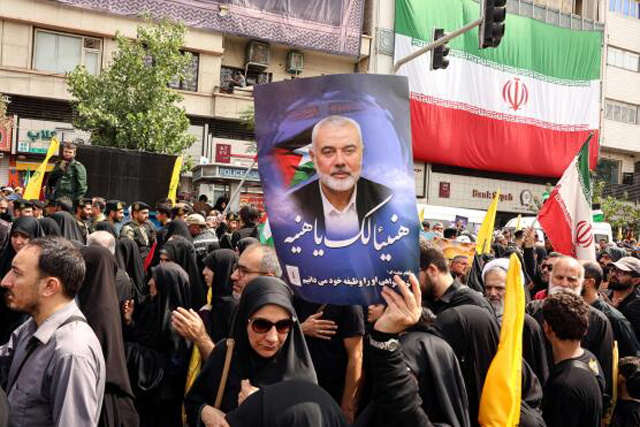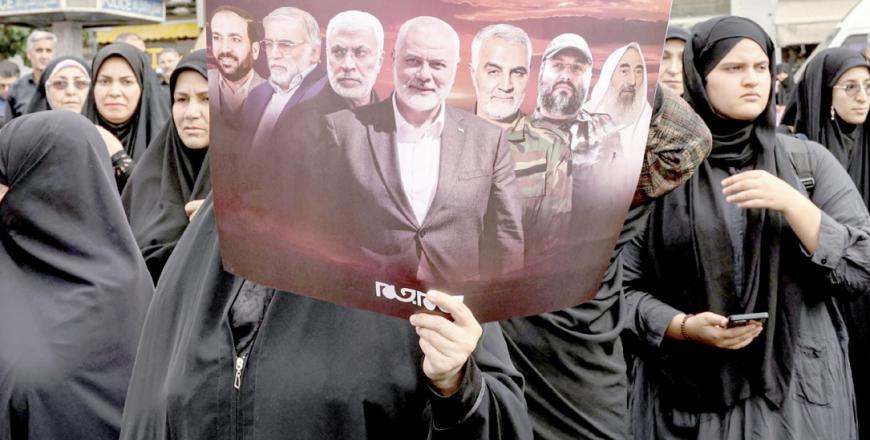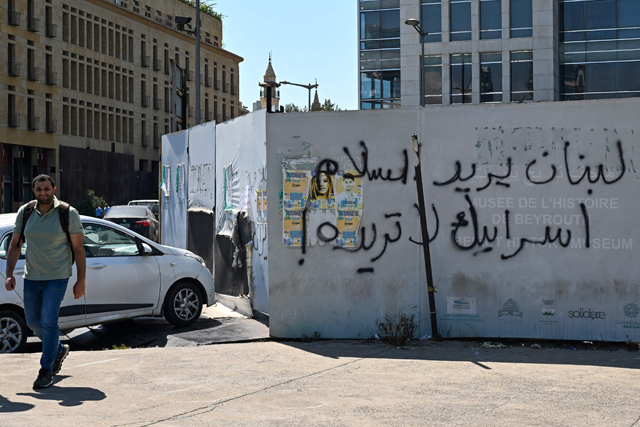You are here
Attack by Iran on Israel is 'likely' but it would be 'carefully calibrated' to avoid full-scale war – analysts
By Ahmad Khatatneh - Aug 14,2024 - Last updated at Aug 14,2024

Iranians hold up a portrait of Hamas leader Ismail Haniyeh at his funeral in Tehran on August 1, 2024 (AFP photo)
AMMAN — Tensions between Israel and Iran have intensified following the assassinations of Hamas chief Ismail Haniyeh in Tehran and Hizbollah commander Fuad Shukr in Beirut, raising fears of a broader regional conflict amid Israel’s ongoing war on Gaza.
Iran has vowed "harsh punishment" for Haniyeh’s assassination, with Israel, although has remained silent on Haniyeh's death, claiming responsibility for Shukr’s killing, accusing him of orchestrating a recent rocket attack that killed 12 youths in the Syrian Israeli-occupied Golan Heights.
Deputy Prime Minister and Foreign Affairs Minister Ayman Safadi, during a recent interview with Al Arabiya news channel, reiterated Jordan's resolve, warning that any airspace violations would be met with a decisive response, regardless of the origin of the threat.
Former minister of state for media affairs Samih Maaitah said that Iran is grappling with a significant dilemma following its pledge to respond to Haniyeh’s assassination.
“Every potential course of action carries substantial risks, whether it involves choosing not to respond, striking a severe attack on Israel, retaliating through proxies, or opting for a symbolic gesture,” Maaitah said.
He added that Israel's prime minister Benjamin Netanyahu is eager to use any Iranian retaliation as justification for a major attack against Iran, Lebanon, and Hizbollah. However, Maaitah pointed out that no party seems willing to escalate the conflict further, as seen during the months-long aggression against Gaza.
“The anticipated Iranian response is driven more by Israeli attacks on Iranian targets outside or inside Iran than by the situation in Gaza,” Maaitah noted.
He also suggested that Iran appears to be leaning towards diplomatic engagements and strategic manoeuvres, recognising the “tremendous” costs that escalating the tension would cause for both Iran and its allies, particularly Hizbollah.
Echoing Maaitah's remarks, former minister of state for media affairs Mohammad Momani said that Iran’s response would be calculated in a way that does not lead to a broader escalation.
“Iran has an interest in keeping the conflict limited as it is,” Momani said, adding: "Netanyahu and his government have an interest in creating new rules of engagement and deterring Iran from continuing to threaten Israel. If Iran responds beyond the current rules of engagement, Netanyahu is likely to escalate further and establish new rules.”
Momani also emphasised Jordan’s role in the conflict, noting that the Kingdom is keen on staying out of the conflict and preventing its airspace from becoming a battleground.
“Jordan will continue to work to protect its national soil and airspace within these limitations and principles."
Strategic analyst Amer Sabaileh highlighted the inevitability of an Iranian response, pointing to the intense diplomatic efforts aimed at containing the response and managing Israel’s likely reaction.
“The nature of the operation targeting Haniyeh within Iran compels Iran to respond in some manner,” Sabaileh said.
However, the real concern, according to Sabaileh, lies in Israel's response to Iran’s actions, particularly given Israel’s readiness for a strong counterattack.
Sabaileh also noted that the "unprecedented" scale of US military personnel in the region suggests a dual objective: to contain Iran’s response and to send a clear message urging Tehran to act cautiously, avoiding actions that could provoke Israel and trigger a broader conflict.
“The presence of military forces in the region aims to deter direct confrontation, but the situation remains precarious."
Related Articles
TEHRAN — Iran held a funeral ceremony on Thursday with calls for revenge after the killing in Tehran of Hamas political chief Ismail Haniyeh
WASHINGTON — The USS Abraham Lincoln aircraft carrier and accompanying destroyers have arrived in the Middle East, the US military said Wedn
TEHRAN — Iran said on Saturday it expects Lebanon's Tehran-backed Hizbollah group to hit deeper inside Israel and no longer be confined to m


















